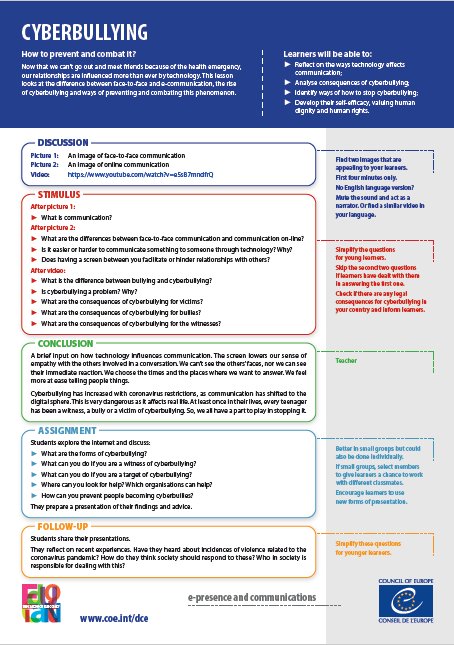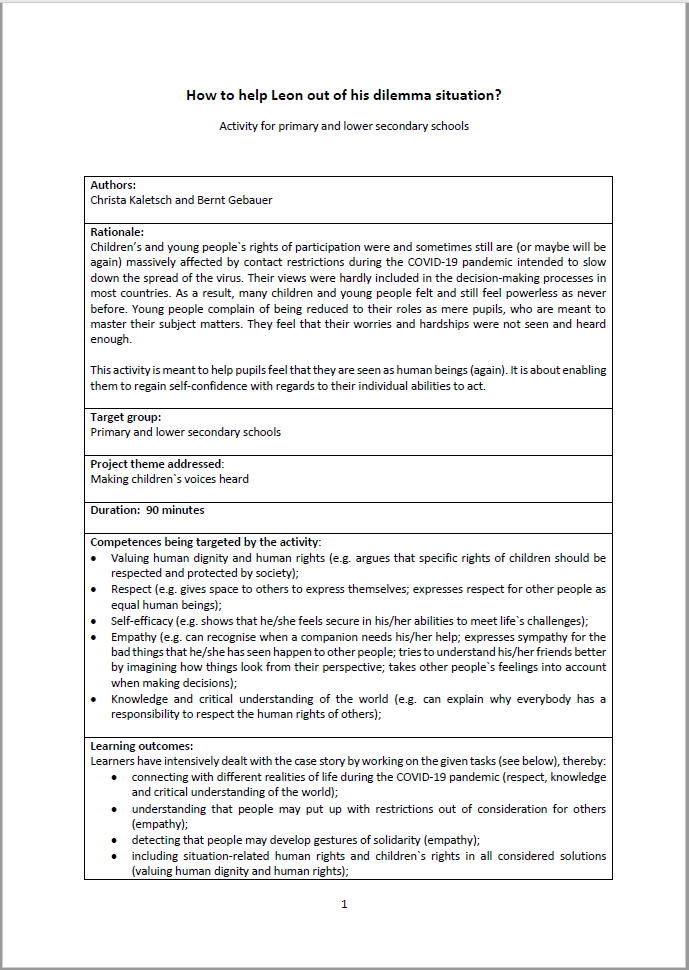New materials

The lesson plans are easy to use and flexible. They can be taught in a variety of distance-learning situations and adjusted to suit available e-learning platforms or devices, age of learners, local context, time on-line and level of digital skills. The simple format allows you to tailor the teaching and learning process to the needs of your learners, building on the tried and tested principles of Education for Democratic Citizenship and Human Rights Education: dialogue, critical thinking, active and cooperative learning.
You are invited to send your feedback on any lesson plans used so they may be improved for other learners in due course ([email protected]).
Find the lesson plans here:
Cyberbullying

Children’s and young people`s rights of participation were and sometimes still are (or maybe will be again) massively affected by contact restrictions during the COVID-19 pandemic intended to slow down the spread of the virus. Their views were hardly included in the decision-making processes in most countries. As a result, many children and young people felt and still feel powerless as never before. Young people complain of being reduced to their roles as mere pupils, who are meant to master their subject matters. They feel that their worries and hardships were not seen and heard enough.
The activity "How to help Leon out of his dilemma situation?" created by Christa Kaletsch and Bernt Gebauer is meant to help pupils feel that they are seen as human beings (again). It is about enabling them to regain self-confidence with regards to their individual abilities to act.
Christa Kaletsch, born in 1967, works as journalist specialized in history, and as an author, program developer and consultant in the fields of constructive conflict resolution, participation and Education for Democratic Citizenship and Human Rights (EDC/HRE). She is associate chairperson of Makista, a Frankfurt/Main based NGO aiming to truly implement the rights of the child in schools, preschools and daycare. As EDC/HRE expert, Christa is also conceptually responsible for the project "Zusammenleben neu gestalten" (How to re-design the way we live together), which supports schools and other educational institutions in actively approaching discrimination, racism and antisemitism.
Bernt Gebauer works for the Hessian Ministry of Education as manager of the project “How to prevent violence and learn democracy in schools?”. He is a trained secondary school teacher (Politics/English) and has many years of experience working as teacher trainer and lecturer in the field of Didactics of Politics/EDC. Bernt also represents the Standing Conference of the Ministers of Education and Cultural Affairs of the (German) Länder in the Education Policy Advisers Network (EPAN) of the Council of Europe.
Find the activity here:

Spring is a time of celebration, albeit somewhat complicated this year by the Coronavirus crisis. We’ve come up with a few ideas and a ‘Beat the Virus’ game (14 language versions) to help parents keep children busy and learn more about what it means to be a digital citizen. These have been translated and adapted to the local context by the following organisations/individuals to contribute to the Council of Europe’s work in this field:
French, Dutch, Greek versions by Insight (www.insight2act.net); Croatian version by Dunja Mijović; Italian version by Stéphane Chaudron (https://www.facebook.com/CDGEurope/); German version by klicksafe.de (http://klicksafe.de/); Icelandic version by Heimili og skóli (https://www.heimiliogskoli.is); Slovak version by DigiQ (https://digiq.sk/en); and Arabic version by CMRPI (https://www.cmrpi.ma)
Arabic
Croatian
Dutch
English
French

Families are currently going through a challenging time. Even when the pandemic and the confinement are over, it will be difficult to backtrack and limit the time that children spend online. However, this can also be an opportunity to reinforce what they’ve learnt during this crisis about the importance of being an active citizen. The Council of Europe publication “Easy steps to help your child become a Digital Citizen” offers a broad range of insights and ideas about things that parents can do with their children to help them understand how and why to share the responsibility of making ‘online’ a fun and friendly place.



